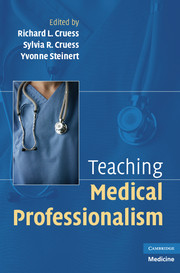Book contents
- Frontmatter
- Contents
- List of Contributors
- Foreword by William M. Sullivan
- Introduction
- PART ONE WHAT IS TO BE TAUGHT
- PART TWO THEORY
- PART THREE PRINCIPLES
- PART FOUR PRACTICE: CASE STUDIES IN TEACHING PROFESSIONALISM ACROSS THE CONTINUUM
- APPENDIX A Definitions of Professionalism
- APPENDIX B Core Attributes of Professionalism
- APPENDIX C The Teaching of Professionalism: Vignettes for Discussion
- APPENDIX D A Matrix for “Matching” Teaching Methods to Attributes
- APPENDIX E Sample Grid for Use with Discussion of Vignettes
- APPENDIX F Sample Questions to Guide Discussion about the Social Contract: Small-Group Leaders' Guide with Suggested Responses
- APPENDIX G Professionalism Program for Residents: Suggested Outline for Small Group Facilitators
- APPENDIX H Sample Evaluation Form for Residents' Half-Day Program on Professionalism
- Index
APPENDIX A - Definitions of Professionalism
Published online by Cambridge University Press: 01 September 2009
- Frontmatter
- Contents
- List of Contributors
- Foreword by William M. Sullivan
- Introduction
- PART ONE WHAT IS TO BE TAUGHT
- PART TWO THEORY
- PART THREE PRINCIPLES
- PART FOUR PRACTICE: CASE STUDIES IN TEACHING PROFESSIONALISM ACROSS THE CONTINUUM
- APPENDIX A Definitions of Professionalism
- APPENDIX B Core Attributes of Professionalism
- APPENDIX C The Teaching of Professionalism: Vignettes for Discussion
- APPENDIX D A Matrix for “Matching” Teaching Methods to Attributes
- APPENDIX E Sample Grid for Use with Discussion of Vignettes
- APPENDIX F Sample Questions to Guide Discussion about the Social Contract: Small-Group Leaders' Guide with Suggested Responses
- APPENDIX G Professionalism Program for Residents: Suggested Outline for Small Group Facilitators
- APPENDIX H Sample Evaluation Form for Residents' Half-Day Program on Professionalism
- Index
Summary
DICTIONARY DEFINITIONS
Oxford English Dictionary, 2nd Edition, Oxford, UK, Clarendon Press, 1989.
The occupation which one professes to be skilled in and to follow. a. a vocation in which a professed knowledge of some department of learning or science is used in its application to the affairs of others or in the practice of an art founded upon it. b. in a wider sense, any calling or occupation by which a person habitually earns his living.
Webster's 3rd International Dictionary of the English Language, Springfield, Massachusetts, Merriam Webster, 1981.
A calling requiring specialized knowledge and often long and intensive preparation including instruction in skills and methods as well as in the scientific, historical, or scholarly principles underlying such skills and methods; maintaining by force of organization or concerted opinion high standards of achievement and conduct, and committing its members to continued study and to a kind of work which has for its prime purpose the rendering of a public service.
SOCIAL SCIENCES LITERATURE
Paul Starr, The Social Transformation of American Medicine. New York, Basic Books, 1984, p. 15.
Professional authority can be defined, in part, by a distinctive type of dependency condition – the dependence on the professional's superior competence. Dependence also arises at times from the emotional needs of clients and the administrative functions of the professions, created especially by the welfare state.
- Type
- Chapter
- Information
- Teaching Medical Professionalism , pp. 279 - 284Publisher: Cambridge University PressPrint publication year: 2008



